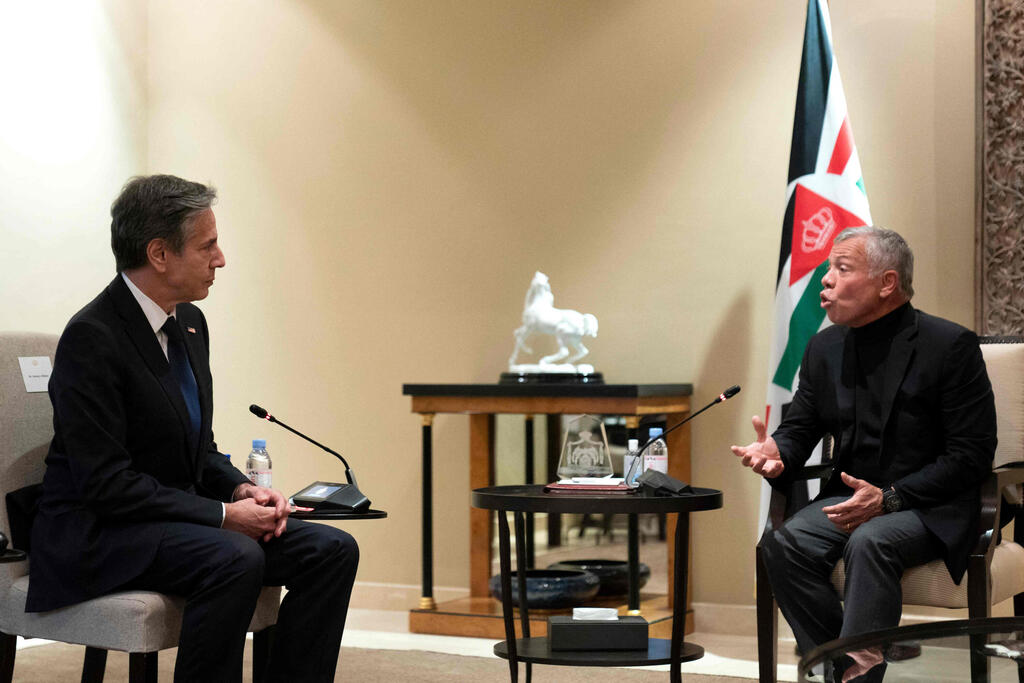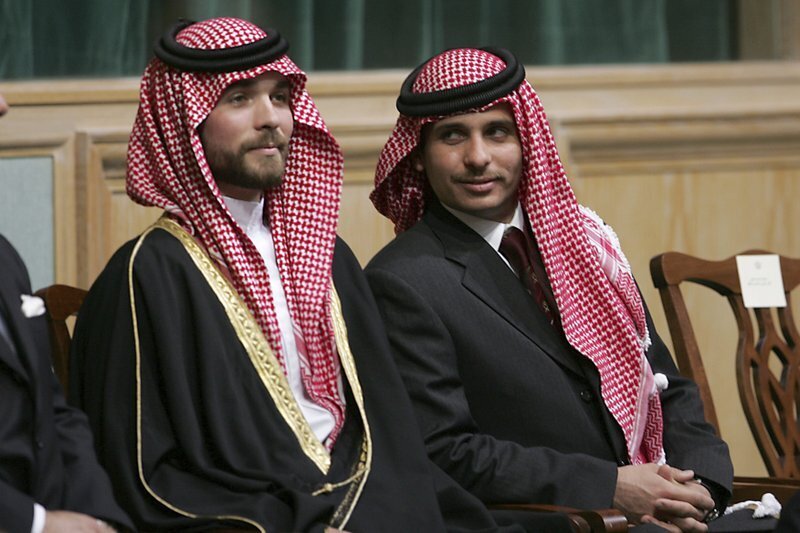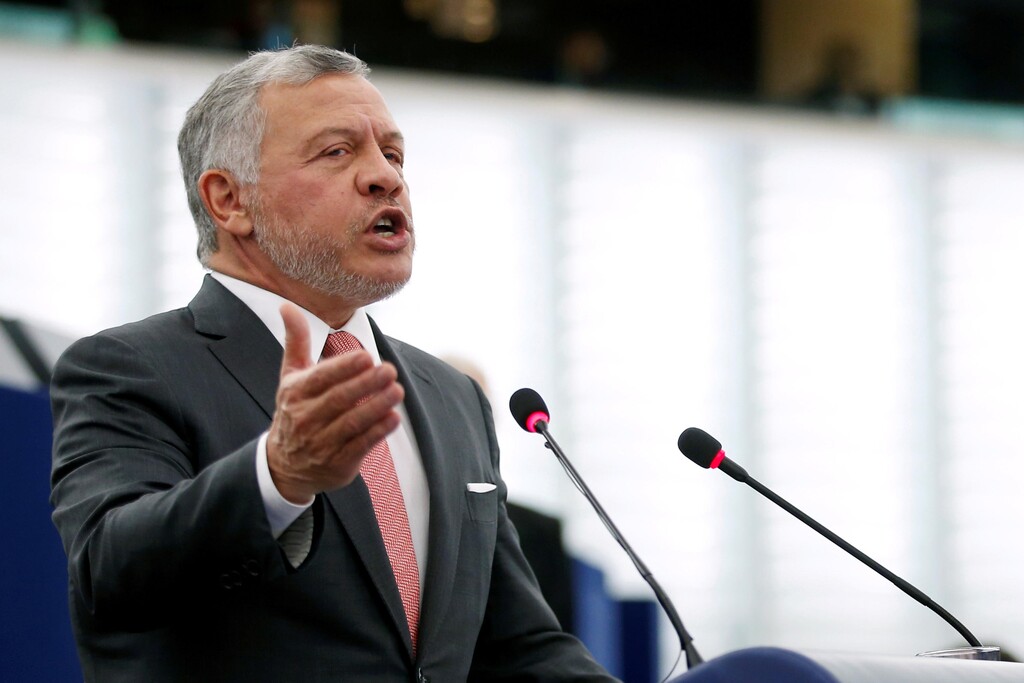Getting your Trinity Audio player ready...
King Abdullah has moved swiftly to shore up his grip on Jordan in the three months since an alleged plot surfaced to replace him with his half-brother, leaving his rule secure for now but still wrestling with big economic challenges.
The crisis ignited by Prince Hamza’s alleged leadership ambitions seems to have been put to bed with a military court this week sentencing two men accused of conspiring with him, and the prince himself ostracized in a palace.
Away from the court proceedings, King Abdullah has sought to reassert his influence over powerful tribes that underpin his rule and for whose loyalty Prince Hamza was accused of competing, visiting their areas and raising his profile.
Officials talk of a king now composed and at ease, in contrast with his apparent anxiety in the first weeks of the crisis, described by the king as “the most painful” because it came from both inside the royal family and outside it.
The trial appears to have passed off without any apparent diplomatic fallout from Saudi Arabia, where the prime defendant, Bassem Awdallah, worked as a top adviser to Crown Prince Mohammad bin Salman, having previously served as the closest adviser to King Abdullah for many years.
The prosecution charge sheet said the accused had agreed that Awadallah would seek foreign backing for Hamza’s ambitions, using his ties in Saudi Arabia and elsewhere, and that Hamza had asked Awadallah whether Riyadh would help him if something happened to him in Jordan.
But the Jordanian authorities never suggested a Saudi role in the plot.
Meanwhile, the support of Jordan’s most important ally, the United States, has seemed unwavering, after an uncomfortable spell during the term of ex-President Donald Trump, whose Middle East peace plan was seen in Amman as an existential threat.
4 View gallery


U.S. Secretary of State Antony Blinken meets with King Abdullah II at Bayt Al-Urdon in the Jordanian capital Amman
(Photo: AFP)
“I just called to tell him he has a friend in America. Stay strong,” President Joe Biden said he told the king in an April 7 call at the height of the crisis.
King Abdullah will next week become the first Arab leader to meet Biden at the White House.
“The king probably has never been stronger than today — internally very solid support, externally very solid support,” said Fares Braizat, a former minister and head of NAMA Strategic Intelligence Solutions think tank.
“The message (of the trial) is to meddle with stability of the country cannot be tolerated.”
Royal rivalries
The episode has offered a rare glimpse of rivalries in the Hashemite family that has ruled Jordan since it became a British protectorate in 1921.
In line with the wishes of his father, the late King Hussein, Abdullah made Hamza crown prince when he ascended the throne in 1999. But he removed him from the position in 2004 and later appointed his son, Prince Hussein, to the post.
Hamza was spared conviction after pledging allegiance to King Abdullah. Initially put under house arrest, he is now isolated in a palace with his family and banned from any public role, people familiar with the situation told Reuters on condition of anonymity.
The military court issued its verdicts against Awadallah and Sherif Hassan Zaid, a distant relative of Abdullah, after seven sessions, saying they sought to create chaos and sedition.
The men, who were each sentenced to 15 years in jail, both pleaded not guilty.
4 View gallery


Prince Hamzah Bin Al-Hussein, right, and Prince Hashem Bin Al-Hussein, left, half brothers of King Abdullah II of Jordan, attend the opening of the parliament in Amman, Jordan
(Photo: AP)
With defense requests to call witnesses denied, the swift trial was a message to King Abdullah’s opponents that he would never tolerate any threat to his rule, politicians say.
Critics say the trial lacked due process and aimed chiefly to undermine Hamza, accused by his opponents of exploiting the grievances of tribes in order to incite them against the king.
“This is a court that doesn’t have the minimum prerequisites of justice ... It’s a political trial and an indictment of Hamza in front of public opinion,” said Lamis Andoni, a political analyst.
A U.S. lawyer for Awadallah said his client had suffered beatings and psychological torture and feared for his life.
The Jordanian authorities denied this.
The U.S. State Department said it was monitoring Awadallah’s case closely and that it took seriously any allegation of abuse.
An economist of Palestinian origin with U.S. citizenship, Awadallah is a divisive figure. He was long vilified by a ruling elite drawn from the country’s tribal chiefs for his influence over the monarch and for his free-market reforms which they saw as a threat to their privileges.
Tribes
Jordan’s powerful tribes dominate the army and security forces and their loyalty to the Hashemites has been repaid for decades with generous state benefits.
King Abdullah has stepped up his engagement with the tribes since the crisis erupted. So has Prince Hussein.
During a visit to the Red Sea city of Aqaba last month, Prince Hussein, 27, criticized maladministration — one of the issues Prince Hamza complained about publicly. Several local officials were dismissed this week.
Economic troubles in Jordan, including diminished aid from Gulf Arab states, have put the patronage system under strain.
The economy was particularly hard hit last year by COVID-19 shutdowns, with unemployment at a record 24%.
Jordan is hopeful Washington will be extending a $1.5 billion annual support program after the IMF praised economic reforms that will help the kingdom get more financing.
The king is seeking to enact economic reforms but faces resistance from the conservative establishment.
“The challenges facing us from hunger, poverty and unemployment and the loss of confidence in state institutions means the fallout of (the Hamza affair) is still with us,” said Khaled Ramadan, a politician and former deputy.



